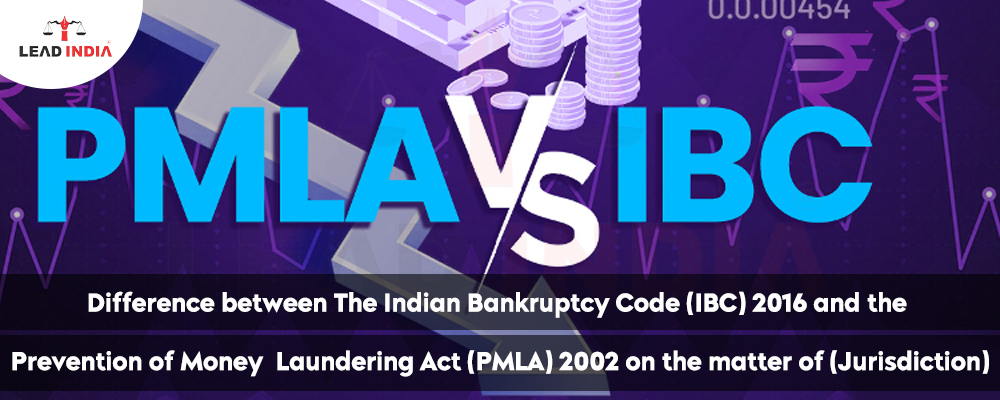The Prevention of Money Laundering Act (PMLA) is an effective tool for combating financial crimes. However, a practical approach is essential, particularly when assets are secured by banks and insolvency proceedings are underway under the Insolvency and Bankruptcy Code (IBC). When banks have genuine claims, prioritizing orderly insolvency resolution under the IBC benefits the public. This maintains company continuity, protects jobs, and promotes economic stability.
The IBC, implemented in 2016, governs insolvency, bankruptcy, and the revival of financially challenged firms. Its key goals are to resolve insolvency cases promptly, maximize asset value, promote entrepreneurship, ensure credit availability, and balance stakeholder interests.
Need A Legal Advice
The internet is not a lawyer and neither are you. Talk to a real lawyer about your legal issue

Conflict between IBC and PMLA
Conflicts occur when the IBC and PMLA have competing claims to the same assets. This frequently occurs when secured creditors with valid claims to assets fight with PMLA enforcement authorities attempting to seize them owing to suspected money laundering. The issue worsens when lenders fund assets targeted by PMLA officials based on suspected offenses committed by the owner.
The moratorium under Section 14 of the IBC, which protects corporate debtors during the Corporate Insolvency Resolution Process (CIRP), adds to the complexity. This could impede the PMLA’s goal of seizing assets tied to money laundering. Section 32A of the IBC also protects the debtor from further prosecution for pre-insolvency offenses after a resolution plan has been authorized.
Courts Navigate the IBC-PMLA Intersection
Recent court opinions shed light on the intricate relationship between the PMLA and the IBC. A significant development is a Bombay High Court decision that emphasizes Section 32A of the IBC. This clause shields a corporate debtor from further prosecution when a resolution plan is adopted, granting the corporation a clean slate.
In cases where the IBC and the PMLA disagreed, some judges sided with the IBC. They reference the IBC’s “non-obstante” clause, which is replicated in Section 71 of the PMLA. This section implies that in the majority of circumstances where provisions contradict, the PMLA will take precedence.
The Delhi High Court decision in Rajiv Chakraborty RP of EIEL vs. Directorate of Enforcement provides a nuanced perspective. It emphasizes a viewpoint similar to that expressed in Nitin Jain Liquidator PSL Ltd. v. Directorate of Enforcement. These decisions contend that actions against a corporate debtor’s assets for pre-insolvency offenses cannot be taken during the CIRP. Once a resolution plan has been approved or liquidation has begun, the process must continue uninterrupted. This interpretation of Section 32A benefits all parties, notably by attracting resolution applicants who would otherwise be discouraged by the possibility of fines for previous violations.
Conclusion: Striking a Balance
Court opinions provide a detailed picture of the interaction between IBC and PMLA. While the IBC, notably Section 32A, frequently takes primacy in insolvency proceedings, there are exceptions. Promoters and directors who are involved in PMLA violations remain accountable. Courts regularly emphasize the importance of a rigorous definition of “proceeds of crime” with a direct link to criminal activity. The apparent contradiction between protecting creditors’ rights and combating money laundering requires a delicate balancing act.
The Supreme Court’s decision to affirm the legality of Section 32A (Manish Kumar vs. Union of India) emphasizes the court’s role in enabling remedies without imposing new burdens on applicants. Collaboration is essential for achieving a practical solution. Before acting, PMLA officials should assess the legitimacy of creditor charges and confirm that there is substantial proof. Recognizing the global character of money laundering and the value of international collaboration can lead to a more consistent application of both laws. Finally, while PMLA remains an important instrument in combating financial crime, a pragmatic approach is required when dealing with bank-charged assets undergoing insolvency resolution under the IBC. Orderly settlement in such matters promotes a larger public good by assuring business continuity, employment protection, and economic stability.
Lead India offers free legal advice and online information, in addition to other legal services. We provide a forum to speak with a lawyer and ask legal questions. Lead India’s solicitors can help you with any legal difficulties. Lead India’s solicitors may assist you with any legal issues. Lead India also provides free online legal help in India. In addition to giving online legal assistance, Lead India allows users to ask specialist questions for free.





 Talk to a Lawyer
Talk to a Lawyer